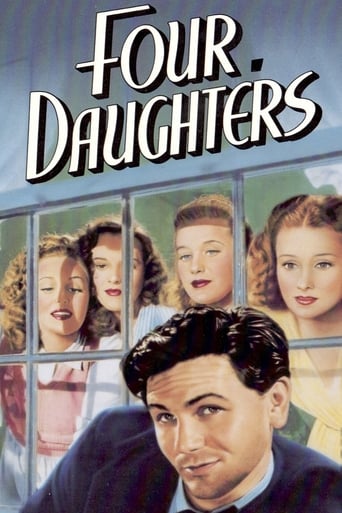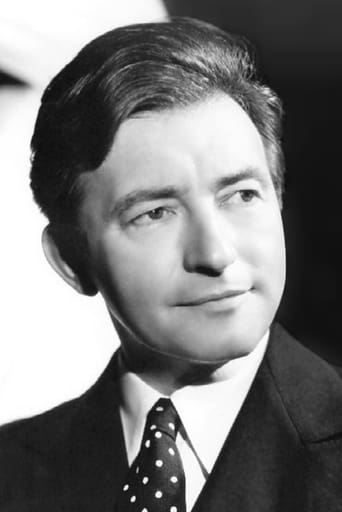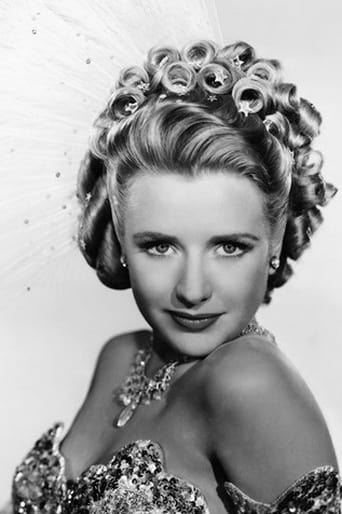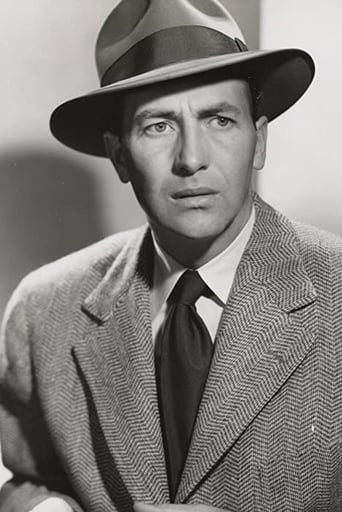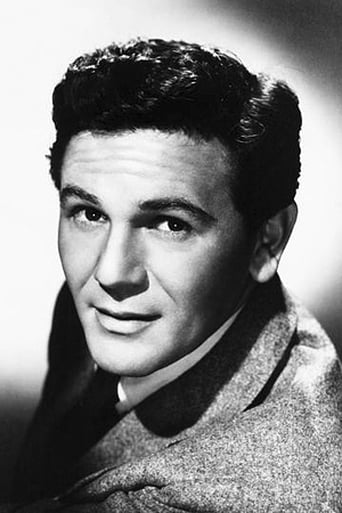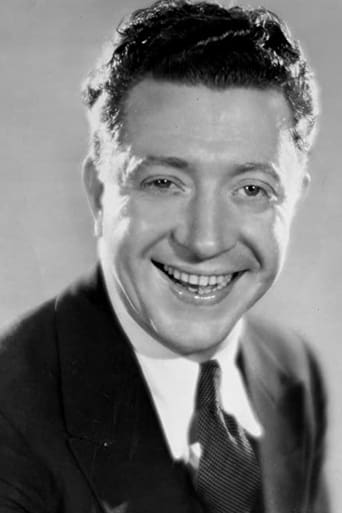disinterested_spectator
In a typical melodrama, we first get to know a family or community, which seems fairly stable. In this case, there is a family of a father and four daughters, along with an aunt. Two of the daughters, Ann and Kay, have no boyfriend. Thea plans to marry Ben, whom she does not love, but that doesn't matter to her. She says that love is overrated. What is important is that Ben has lots of money and can provide her with status. This would not be so bad if she were good at faking it, as some gold diggers are, but throughout the movie it is obvious that she cannot stand him physically, recoiling whenever he tries to be affectionate. Emma is just the opposite. She has a suitor named Ernest, whom she jokes about marrying. However, she does not love him, and for her, that is very important. She talks about wanting a "storybook" romance, a "knight in shining armor on a white horse," while Ernest is quite the other thing. As a result, she figures she will end up an old maid. Ann is perplexed about the whole notion of love, asking Emma if it is possible for someone to come along that she would love more than the members of her own family. This turns out to be more than an idle question.As is also typical in a melodrama, once we are acquainted with a stable family or community, a bachelor comes along and really stirs things up. In this case, the bachelor is Felix, who is handsome and supposedly charming, but I found him to be a bit irritating. He thinks he is being oh so cute when he flirts with the elderly Aunt Etta, acting as if she is young and pretty. Well, Etta goes for it, but a lot of older women hate that kind of patronizing attitude, because it only underscores just how old they are. Especially irritating is the way that men who do that sort of thing seem so pleased with themselves, imagining that they are bringing a little happiness into the life of an old woman. And he is bossy, telling everyone where to sit at the table in their own home. But just like Aunt Etta, everyone in the family seems to be charmed by him, to the point that all four sisters start falling in love with him.As if one bachelor were not disrupting enough, another one enters the community, a man named Mickey, who is convinced that the fates are against him and that he will always be a loser. He falls in love with Ann. However, Felix asks Ann to marry him and she accepts. They announce their engagement at her father's birthday party. Mickey is crestfallen, and so are the other three sisters. Kay, who had been procrastinating about going to Philadelphia to study for a singing scholarship, immediately announces that she intends to do just that. Thea, who had been stalling Ben about setting a marriage date, immediately announces that she will marry him in June. Ernest, thinking that Emma will be similarly disposed, suggests getting married, but she rebuffs him, and goes into the kitchen to cry.On the day of Ann's wedding, Mickey not only tells Ann that he loves her, but also reveals that Emma was heartbroken when she found out that Felix was going to marry Ann instead of her. At first Ann does not believe it, but later she sees that it is true. Now we get the answer to Ann's question as to whether romantic love is stronger than love for a family member. In what can only happen in a melodrama, she leaves Felix standing at the altar and elopes with Mickey. This is absurd for two reasons. First, Ann believes that by jilting Felix, he will marry Emma on the rebound, but of course that doesn't happen. In fact, Emma ends up settling for Ernest after all. Second, even if she did think that her sacrifice would result in Felix and Emma getting married, there was no need for her to marry Mickey, whom she did not love.Four months later, Ann and Mickey are struggling financially. When they go back home for a family reunion at Christmas, Mickey sees how Ann reacts when she sees Felix again, realizing she still loves him. In a typical melodrama, things get so messed up and complicated that someone has to die in order for things to get straightened out, and that is what happens here. Between not being able to provide for Ann, and her still loving Felix, Mickey decides to commit suicide by driving really fast in a snow storm. Apparently he had never read "Ethan Frome." Well, things don't turn out that bad, but he does wind up in the hospital, living just long enough to say a few words to Ann before he dies. In the next scene, we see it is spring. Felix returns and it is clear that eventually he and Ann will get married.In the remake, "Young at Heart" (1954), Mickey, under the name of Barney (Frank Sinatra), does not die. However, the happy ending is suspicious, because we never see him get out of the hospital. We go from Barney apparently dying in the hospital at Christmas to Barney sitting at the piano in the Spring, surrounded by the entire family, including his wife Laurie (Doris Day), who corresponds to Ann. Furthermore, for the first time in the movie, he seems to be happy, instead of being the disgruntled loser that he has been through the whole movie.There are two ways to interpret that ending. Either it is just a completely artificial, tacked on happy ending, with no effort made to explain how he recovered or why his personality has changed; or it is Barney's final hallucinatory dream just before he dies. I prefer the latter interpretation.
MartinHafer
The film is about four daughters (three of which are real life sisters) and their deliriously happy life with their father (Claude Rains) and crusty but lovable aunt (May Robson). They live in a large house and spend most of their time singing and adoring each other's company. They are certainly a happy bunch. When the story begins, it seems that these four grown daughters are starting to discover men--and each, in turn, has a romance. Clearly the daughter who gets the main focus of the film is played by Priscilla Lane--and this is probably because of the three Lane sisters, she was the most famous.As for Priscilla, while I know it will give away much of the film, I just couldn't understand her romance in the film. The guy who you think is going to marry her has everything--he's handsome, clever and makes you laugh. Yet, on her wedding day, Lane runs off with the broody and rather annoying John Garfield (in his first film). He is clearly the disaffected bad-boy type and emotionally incapable of showing love--interesting, of course, but it made no sense why Priscilla chose him. So, while this is an interesting plot line, it never seemed particularly real--though I liked how they worked it all out at the end.Overall, not a great film due to the odd plot (you really do HATE Priscilla's character at times) but the acting is great and the mood is sweet. Apparently, the public loved it, as Warner Brothers made several follow-up films.
tjonasgreen
It isn't hard to see why frequent moviegoers in 1938, wise to the formulas of most movies, would have found FOUR DAUGHTERS a fresh and surprising picture. The story of four musical sisters and their romantic problems begins as conventionally as any Deanna Durbin musical but quickly evolves into an absorbing romantic melodrama.Director Michael Curtiz keeps all four actresses bubbling sweetly and predictably, but when Jeffrey Lynn enters the picture trouble begins. Though one sister is engaged and another nearly so, all four in some way become smitten by this young musician. Then the script tops itself (and electrified audiences) by introducing a further complication named John Garfield. Cynical, depressive, darkly attractive and clearly a New York 'ethnic' type, Garfield is in every way the opposite of tall, handsome, WASPy Jeffrey Lynn, who in any other picture would probably have made more of an impression. Though friends, the men vie for Priscilla Lane, whose unaffected acting style creates a nice tension with both actors. Believing it best for her sister, Priscilla marries the wrong man, at once confounding and satisfying audience expectations. Halfway through this film you are apt to wonder what will happen next and how events will play out, which is not what you expect from the sunny opening.Garfield's success overshadowed every other good thing about this film. Clearly Warners' thought they had a successor to Jimmy Cagney. In fact they had the forerunner of Robert Mitchum, Robert Ryan, Montgomery Clift, Brando and James Dean, though Garfield was warmer and more likable than any of those. This movie was remade in 1955 as a Technicolor musical called YOUNG AT HEART starring Doris Day and Frank Sinatra. Though not a bad idea in theory, the original is a better film.
